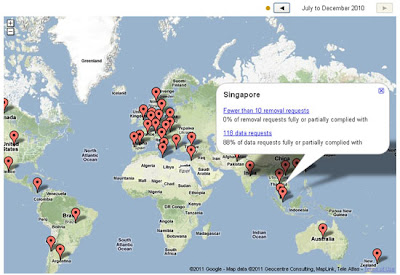Perhaps things are beginning to look up for the local political scene now that PM Lee has acknowledged that there are no longer any "sure-win constituencies". WP's Chen Show Mao has succinctly spelt out what it means for Singaporeans to have a voice for the good of the nation. We live in interesting times.
A mature rivalry between PAP and WP?
Singapore's ruling party for 46 years has sounded a warning to its followers that its era of easy election victories is over.
Future contests would be tougher, said Prime Minister Lee Hsien Loong, who added that he no longer expected "clean sweeps" or "safe wards anywhere".
Lee appealed to 1,500 party activists to help him build a new People's Action Party (PAP) for a new phase.
This was its first convention since the poor election showing six months ago.
Last week, as PAP prepared for its crucial meeting, rival Workers' Party (WP) launched the biggest offensive in the East Coast constituency since May.
It lost narrowly to the government (45-55 per cent) and appears determined to win it in 2016.
While Lee was exhorting his party to work hard to regain lost ground, WP members — wearing blue — were out in force at hawker centres and markets to sell the party organ The Hammer to families.
The two events show the extent of Singapore's political intensity although the next election is still five years away.
Both sides have appealed to Singaporeans not to let the political divide create rifts in society.
After years of acquiescence to former prime minister Lee Kuan Yew, who governed Singapore with an iron hand, a new generation of Singaporeans is beginning to assert itself.
As a result, politics is steadily becoming a passionate subject and quite unpredictable, with more people who stayed away before taking sides now.
Friendly match
Several opposition parties are emerging as challengers, but as of now only PAP and WP, the two oldest parties here, figure strongly in the contest.
Both are committed to pursue their politics with a sense of maturity and responsibility so far.
Lee had earlier surprised Singaporeans when he invited six Workers Party MPs to join parliamentary committees to play a recommendation role in policy- making.
With Kuan Yew no longer in the Cabinet, although still an MP, the younger set of MPs from both sides is trying to find a practical way to work together.
The political landscape is changing, but what the present House will do will leave its mark — good or bad - in history.
There has been video coverage of opposing MPs organising joint community functions for residents, their differences temporarily laid aside.
Last month, the MPs formed a football team, complete with red jerseys, to play a friendly match against a team made up of media representatives.
The politicians, among them two opposition MPs, lost the match 2-1.
The general reaction, especially among younger Singaporeans, was one of excitement and people want to see more of such matches.
"It was good to see them put aside their political differences and fight a common battle on the same side," said a Malaysia Cup fan.
He suggested the Singapore MPs team take on Malaysian politicians in a similar match as a prelude to the Malaysia Cup kick-off.
The younger generation is watching with interest to see how the two parties treat each other.
'Not the enemy of the government'
Unlike other Asian countries, Singapore has rarely had any real experience of intense Parliament debate since the left-wing Socialist Front quit Parliament and took to the streets.
A few sharp exchanges had taken place between Lee Senior and the late J.B. Jeyaretnam, but that was prior to the emergence of the Internet and mainstream coverage was minimal.
The newly-appointed Speaker Michael Palmer has urged MPs not to get lost in "the quagmire of party politics".
Writing in an editorial for PAP magazine The Petir, Palmer said worthwhile suggestions should not be attacked just because they were made by the opposition.
From the other side came utterances like the following from Workers' Party MP Chen Show Mao:
"Let me state quite clearly how I see myself as an opposition member of this parliament. I may challenge government policy in Parliament, but I do not by definition oppose government policy.
"It does not mean that I do not support the government in its work. I am an opposition MP and will perform my role to voice alternative and opposing views in the law- making process.
"As an opposition MP, I am not the enemy of the government; I am a Singaporean and a patriot."
PAP's behaviour towards its rivals has taken a sharp turn for the better.
Possible motive
Some observers see a possible long-term motive in why the two parties — whose ideological differences are not very wide apart — wish to compete without personal attacks or animosity.
Firstly, Singaporeans are by and large moderately inclined and dislike to see politicians at each other's throats.
The second reason is that both parties are pragmatic enough to realise that politics is entering an unpredictable phase.
Few can be sure whether one day one may need the other in a realignment of interests.
The ruling PAP is facing an uphill task trying to attract quality candidates from the private sector to stand in elections.
According to WikiLeaks, the leaked US diplomatic cables, PAP MP Charles Chong admitted that the party had to field "second and third-tier candidates" since the 2006 election.
Unless PM Lee succeeds in reversing his recruitment fortune, the next election could spell greater trouble.
No one really believes PAP will be overthrown but if it fares badly, having a workable relationship with the rival will be a very useful thing.















